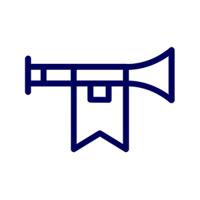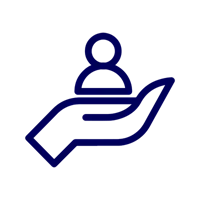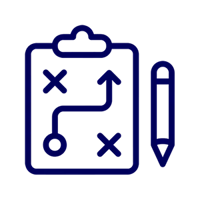
Joanna Barstow
Ernest Rutherford Fellow at The Open University
Despite media portrayals, being a scientist isn't about being a lonely genius. Real science is all about collaboration, and for me the teamwork is what makes it fun.
About Joanna...
Who am I?
"My three personality types were campaigner, coordinator and manager. I'm not sure they match perfectly, but I can see how some of the qualities under each fit with my job. A campaigner is creative and passionate - scientists often care deeply about the subject they study, and I am no exception. I also often have to be creative to find solutions to problems. Campaigners are also good with words, which is very important for scientific communication. A coordinator has to be organised, work as part of a team, and be patient and compassionate - these are all traits that are really important for working as part of big international teams, especially if you're leading part of it. And finally, managers are motivated, adaptable and open-minded - all really important for interpreting observations and working out what's actually going on. I think all three of the personality types I matched with have 'organised' in the list - I wish I was that organised! I try to be but life often gets in the way. Being organised is also a useful trait for a scientist. "
What do I do?
"I am a planetary scientist and astrophysicist, which means I am a scientist that specialises in studying planets and objects in space. I use telescopes to study the atmospheres of planets orbiting stars other than the Sun - these are called exoplanets. By measuring tiny amounts of starlight that have filtered through the atmospheres of these planets, we can determine what they are made of. My particular role is to make computational models of atmospheres that we can compare with the information we get from telescopes, so I spend most of my time working at a computer. By doing this, we hope to learn more about how planets work, and about how the Earth and the other planets in the Solar System might have evolved to be the way they are today. I love finding out new things about the universe and being able to share that with others - either our students, the public, or school groups. My current role is focused on research, but I am also involved with teaching undergraduate students. The Open University is different to most universities because all of our undergraduates learn remotely rather than coming to us to hear lectures, so teaching there doesn't involve standing up at the front of a lecture theatre and talking, it's more about producing online resources for the students to use. The starting salary for a postdoctoral researcher, which is usually the first step in an academic career once you are fully qualified, is around £35,000 a year. You can generally expect this to increase a bit each year. "
How did I get here?
"After finishing my DPhil (doctoral degree) at the University of Oxford, I got a postdoctoral research job there and stayed for another 4.5 years. I then secured a Royal Astronomical Society (RAS) research fellowship, which I held at University College London. After that, I moved to the Open University as a lecturer for a few months, and then started my current role as an Ernest Rutherford Fellow, which is another research-focused post. A few months into my RAS fellowship I took maternity leave for 11 months, and I did the same again a few months after the start of my current fellowship. I chose to become a planetary scientist because I received a Nuffield Bursary when I was 16 to work as a summer intern at the University of Leicester, where preparations were underway to receive measurements from the Beagle 2 Mars lander, then en route to Mars. The lander, sadly, did not work as planned when it arrived on Mars later that year, but those few weeks in my summer holiday was enough for me to realise that I really loved finding out about other worlds. "
The life I live
"I am a mum to two young daughters, so I don't have a great deal of spare time any more! Before I had my children, I used to perform as part of an amateur musical theatre group, which was something I really loved and I hope I get back to one day. I still sing regularly in my church choir, and I have just joined the Open University Wind Band which has meant me dusting off my flute after far too long - playing about one note in five, and not all of those correctly! I enjoy playing Disney songs on the piano for my girls to sing along to. I also love to draw - the girls get a homemade birthday card every year, usually with their current television favourites, and I also make portraits of them when I get the chance. I recently got into needle felting (stabbing wool is very therapeutic, but the needle is extremely sharp and my thumb has suffered more than once!) and I have made a solar system mobile for my younger daughter's bedroom. I love reading fiction - scifi, fantasy, detective, pretty much anything. I especially love series with really well-built worlds and casts of characters that you can properly inhabit. "
My typical day
"My day usually starts with checking and responding to email - I get much more email than I used to! I also check Slack, which is a collaborative working tool that allows messaging and group chats on specific topics - a lot of my research-related communication goes through Slack. Depending on the day, I might have a meeting with one of the graduate students I supervise, and the rest of the supervision team, to discuss how their work is going. I will probably check on some computer programs I have running, and look at the results if they are finished. I might be writing some of my work up in the form of a scientific paper, or contributing to someone else's paper, so writing is a huge part of my job - that's something that I think comes as a shock to a lot of students. If I'm due to give a talk at a conference I might be preparing slides for that. I might also be reviewing somebody else's scientific paper, or an application they have made for money to fund their research, so how to provide useful and constructive criticism of other people's work or ideas is also a really important skill to learn. I also have several meetings each week to discuss work on large projects that I am part of - the moment, I am part of a very big team (well over 300 people, from several different countries) working on observations taken with JWST, a new space telescope that launched at the end of 2021. So, so summarise, there's a lot of arguing with computers, a lot of writing (and reading), and quite a lot of talking, too! "
My qualifications
"5 A-levels including Physics & Maths; MSci in Natural Sciences/Experimental and Theoretical Physics (4 years); DPhil (PhD) in Planetary Science (3 years)"



